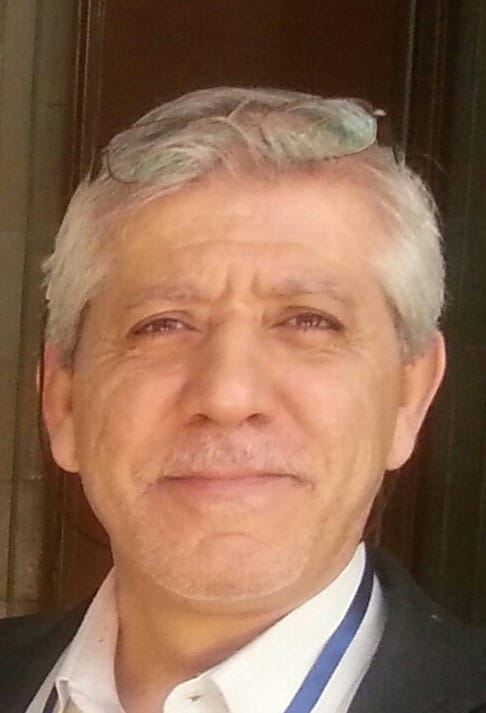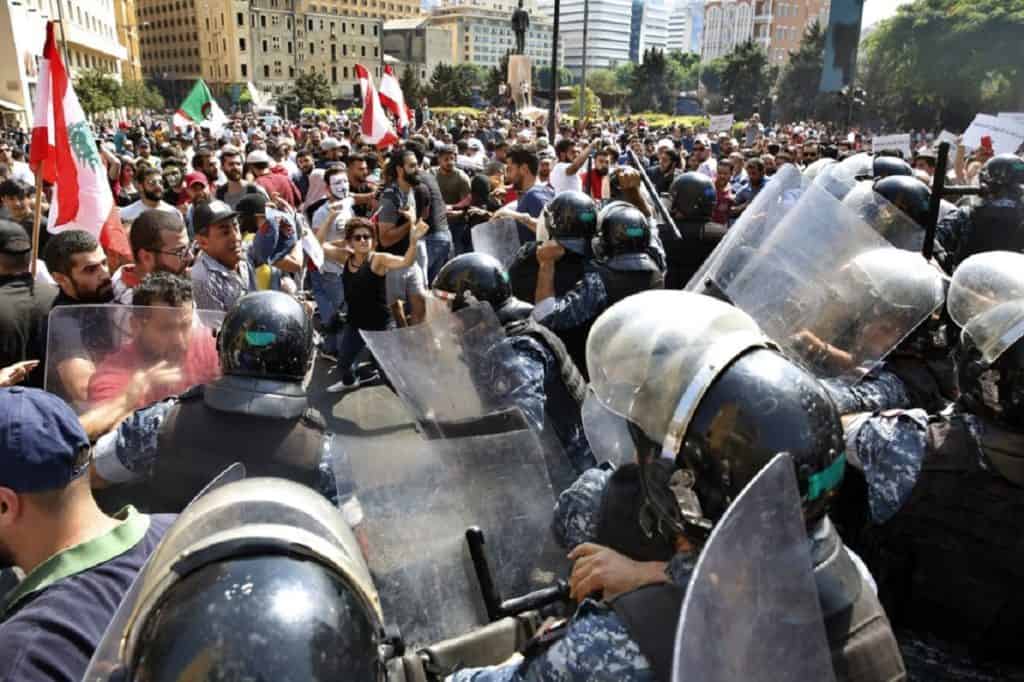By Denis Korkodinov – Interview with Fouad Khcheich
For three days in a row, protests have been taking place in Lebanon. The unrest was caused by the Saad al-Hariri government’s attempt to impose a tax of 20 cents per day for Internet voice calls using apps including WhatsApp, Facebook, and FaceTime.
However, under pressure from the crowd that staged the riots and attempted to forcibly overthrow the government, the Lebanese head of government was forced to abandon the tax reform. Meanwhile, this did not reassure the ordinary Lebanese, who began to demand the resignation of Saad al-Hariri.
Thus, Lebanon was in a state of internal crisis. The situation is complicated by the fact that a number of international players are trying to use social unrest in Beirut in their own interests. In particular, Israel began to actively use the protesters to implement an anti-Lebanese company.
Especially for World Geostrategic Insights, we talked about this with the Lebanese political expert Fouad Khcheich.

1. There is an opinion that the recent Israeli attacks in the vicinity of Beirut, a series of wildfires, accusations by the Lebanese Prime Minister of financing a prostitute from South Africa and protests caused by attempts by the Saad al-Hariri government to implement tax reform are interrelated. Thus, a number of international experts hinted that Israel might be behind the organization of a series of acts of sabotage of an anti-Lebanese orientation. Arguing this thesis, experts say the following: by delivering a missile and bomb attack on Hezbollah’s facilities located in Lebanon, Tel Aviv failed to provoke the government of Saad al-Hariri to put pressure on pro-Iranian groups. Moreover, after attacks in the vicinity of Beirut, the head of the Lebanese government clearly took an anti-Israeli position. As a result, Israel could make efforts to destabilize the internal situation in Lebanon, hoping, thereby, to overthrow Saad al-Hariri by popular protest. For this, a series of flattering fires was organized that caused the Lebanese economy, which was already experiencing difficult times, significant damage. For the same reason, an information campaign was launched mainly in the Israeli press to discredit the Lebanese Prime Minister. The discredit campaign was based on rumors about Saad al-Hariri’s intimate connection with the model from South Africa, Candice van der Merwe. Not limited to this, Beirut and several other cities in Lebanon organized social unrest caused by the tax reform of the Government of National Unity. The main political slogan of popular protest was the demand for the resignation of Saad al-Hariri. In this regard, the question is quite appropriate: could Israel really be involved in the organization of the anti-Lebanon campaign and of thecoup attempt in the country? How interested is Tel Aviv in changing the political regime in Lebanon?
– Of course, the Israeli factor is always present in Lebanese political reality. In Lebanon, there is clear interference and attempts to put pressure on the government and reveal old documents, for example, the relationship between Prime Minister Saad al-Hariri and a model from South Africa. In addition, there is a charge that Saad al-Hariri is close to Hezbollah, and there is Saudi pressure at this level.
No one excludes that there will be no Israeli hands in organizing fires in Lebanon. In this regard, information in Beirut and other cities is widely disseminated about drones that dropped incendiary bombs in the forest. One of these drones was shot down by locals.
At present, more than 120 centers of fire have already been identified, covering more than 1,500 hectares of Lebanese forests within 48 hours. This significantly exceeds the annual rate of fires that systematically occur in Lebanon.
The national government is demonstrating a serious lack of fire fighting equipment because Lebanon is unprepared for such disasters and the forest area in Damur and Musharraf has been identified on the map as one of the most dangerous places at risk of fire. Therefore, the government is not particularly trying to eliminate the fires. This criticized ordinary citizens who saw that politicians were not fulfilling their duties.
In turn, Israel began to actively use the press to spread false rumors about the failure of Lebanese state institutions. Under the influence of these rumors, the local population began to criticize the current government even more.
2. At the moment, the most striking message from Lebanon from one of the participants in the protests Joseph Nemr (Joseph Nemr) is the following: “If there is a revolution, let it be … Revolution lies at the heart of the Lebanese people.” Does this message reflect real sentiment in Lebanese society? Is there a sharp imbalance between power and society in Lebanon?
– In accordance with their political preferences and, possibly, religious differences, the Lebanese were divided into opposite groups when evaluating the ongoing protests, which proved the failure of the public administration system. These protests arose because officials were unable to fulfill the minimum intuitive requirements of citizens.
Corruption in Lebanon continues to grow more and more, trying to take the last piece of bread from the poor and middle-income people, imposing excessive taxes on them, as if they were to blame for the deepening economic crisis.
Meanwhile, ordinary Lebanese citizens do not see the protest as an anomaly, because they are seeking the desired changes to force officials to act, rather than pursue a policy of ignoring.
There is an opposite opinion, especially supported by supporters of parties that make up the majority in the government, who began to accuse the people of conspiring against the existing government.
The Minister of Finance of the Government of National Unity of Lebanon, Ali Hassan Khalil, for his part, said that at a meeting with Prime Minister Saad al-Hariri, a budget was approved without any taxes or new fees. But, as it turned out, this was not true. The government tried to introduce excessive and burdensome taxes, as a result of which the people began to protest.
To claim that this is a revolution is too early. So far, the government has a chance to change the country’s economy and politics for the better, to appease the crowd. But if officials do not take this chance, then anything can happen.
3. What is Hezbollah’s position regarding the protest movement in Lebanon?
– On October 19, 2019, Hezbollah’s general secretary, Hassan Nasrallah, declared that anyone who “evades the responsibility for the status quo” should be tried. This statement contained a harsh message for those who allowed the situation to arise when people began to protest.
Among other things, the Hezbollah leader asked his deputies to remain in their homes and not to participate in government activities.
This circular was translated yesterday due to the absence of party deputies for the first time from the front line during a speech by the party’s general secretary, Hassan Nasrallah, taking part in a march in the city of Baalbek.
Hezbollah formally advocates for people’s demands, but it will not participate in sit-ins. In addition, ordinary Lebanese are distrustful of the party due to the fact that it is also accused of corruption. Therefore, if Hezbollah tries to join the protesters, the people will reject it.
4. On October 18, 2019, a meeting between the Lebanese President Michel Aoun and the leaders of the protest movement took place in the presidential palace in the southeastern suburb of Beirut. During the meeting, the parties discussed issues related to the planned resignation of the cabinet and its replacement by the emergency cabinet before the early elections. How likely is Lebanese President Michel Aoun to agree with his government reform plan? What are the forecasts regarding the composition of the new cabinet of Lebanon if the government of Saad al-Hariri resigns?
– The process of forming a new government will not be an easy task, as many political forces seek to use the crisis to establish their positions. However, the fact that the former Saad al-Hariri government will resign is almost inevitable.
In order to carry out some reforms and lower taxes, a detailed plan was presented to Lebanese President Michel Aoun, which includes concessions to the public. However, there is a great risk that this plan will not be implemented by the country’s leadership. And then the protest will be suppressed by force. But this is unlikely to calm the people who are ready to demand the observance of rights in full.
Image Credit: AP Photo/Bilal Hussei







